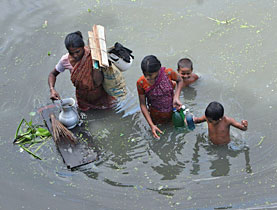Connecting human rights to the environment

As sea levels rise and droughts become more common, the human rights of those affected must not be forgotten, an international conference in Lucerne has heard.
According to participants, environmental change is likely to hit poorer countries the hardest, but richer nations like Switzerland can help tackle the problem.
“Climate change is not only about reducing carbon emissions to eliminate carbon dioxide from the atmosphere, it’s also about the victims,” said Jorge Daniel Taillant, director of the Argentina-based Center for Human Rights and Environment.
Taillant was one of more than 70 speakers at the two-day International Human Rights Forum on the issue of rights and the environment.
“Affected communities are very concerned about their future and their human right to life,” he told swissinfo.
Taillant also highlighted other human rights impacts, such as pollution of water caused by the mining sector, or deforestation by the wood industries.
Lalita Ramdas, board chair of the environmental non-governmental organisation Greenpeace, said that environmental protection was no luxury.
“It’s not just the rich, it will be the poor who will be affected much more because they simply do not have the means to protect themselves,” she told swissinfo.
There are signs the issue is gaining ground internationally. The United Nations last month endorsed a resolution by the Maldives and other countries underlining how climate change was affecting people in small island states, coastal areas or places subject to droughts and floods.
Some areas, such as flood-prone Bangladesh, are already feeling the effects of global warming, experts say.
Economic concerns
But there is no easy answer as to whether economic growth and environmental concerns – another key issue – go together, says Jean-Daniel Gerber, head of the Swiss State Secretariat for Economic Affairs (Seco).
“If you have worldwide growth then they are probably more compatible than when you have stagnation or deflation,” he told swissinfo.
Gerber, who addressed participants on last day of the forum on Wednesday, said the example of Haiti showed that there was not much money left over for environmental issues in stagnating economies.
However, firms make profits and state budgets are in a better shape in a thriving world economy. This means more money is available for research and development, Gerber said.
“We absolutely need the innovation and technology to fight environmental problems,” he said.
Switzerland’s role
Gerber added that Switzerland with its melting glaciers also suffered from the effects of climate change. The impact could not be lessened through domestic measures alone.
He said the country played an active role in UN environmental efforts as well as in the World Trade Organization’s Doha round, which also negotiates rules on trying to avoid conflicts between the environment and trade.
But it is not just up to governments to offer incentives to safeguard the environment, he said. The public is also responsible through its lifestyle choices, as are firms – who are big polluters as well an innovators.
Taillant criticised transnational companies in particular for often eluding national legislation, adding that countries should do more to regulate environmental offenders.
For her part, Ramdas said it was time for the industrialised world to react. “The environment is everyone’s responsibility, but there’s a greater share which always falls onto the shoulders of those who have better resources to address the problems,” she said.
swissinfo, Isobel Leybold-Johnson in Lucerne
The International Human Rights Forum Lucerne (IHRF) aims to support and develop the debate around human rights.
This year the subject was human rights and the environment.
More than 70 people presented contributions to the forum and there were more than 30 workshops during the two-day meeting, which finished on April 23.
The Geneva-based UN Human Rights Council endorsed a resolution on human rights and the environment at its meeting last month.

In compliance with the JTI standards
More: SWI swissinfo.ch certified by the Journalism Trust Initiative



You can find an overview of ongoing debates with our journalists here. Please join us!
If you want to start a conversation about a topic raised in this article or want to report factual errors, email us at english@swissinfo.ch.